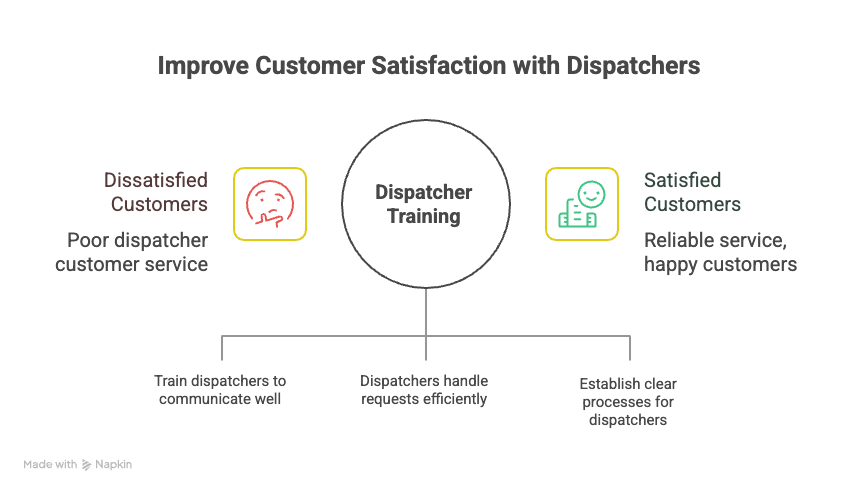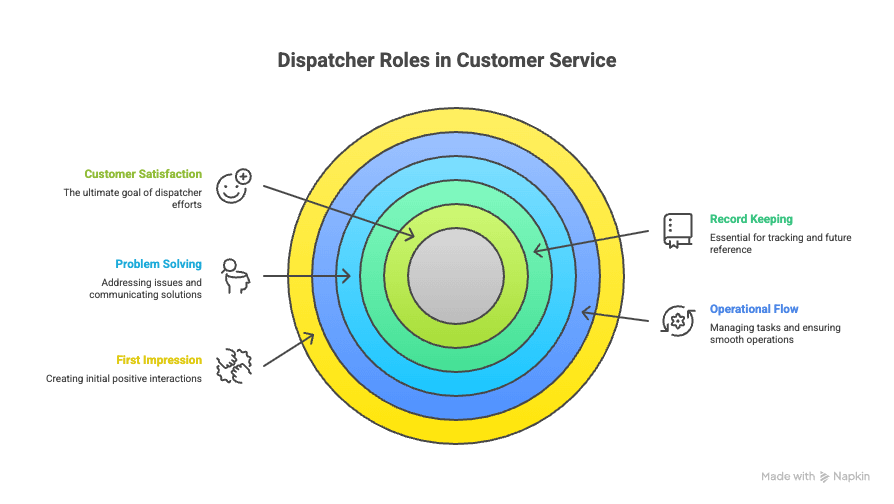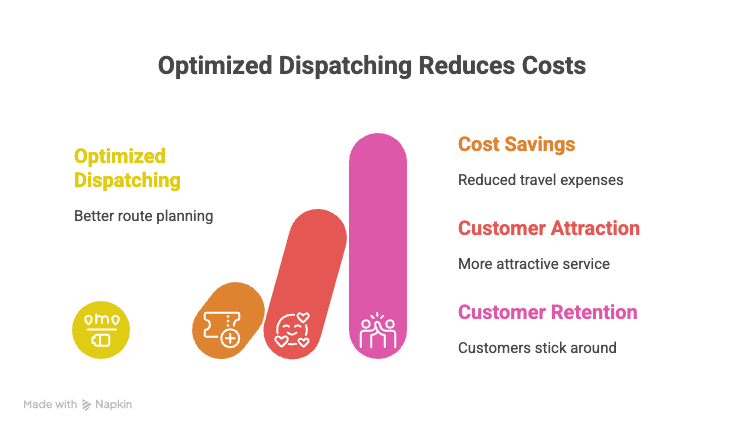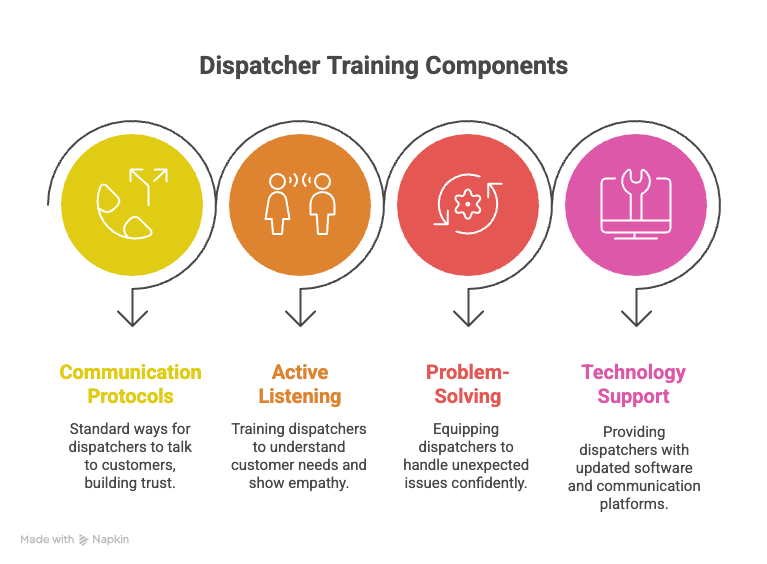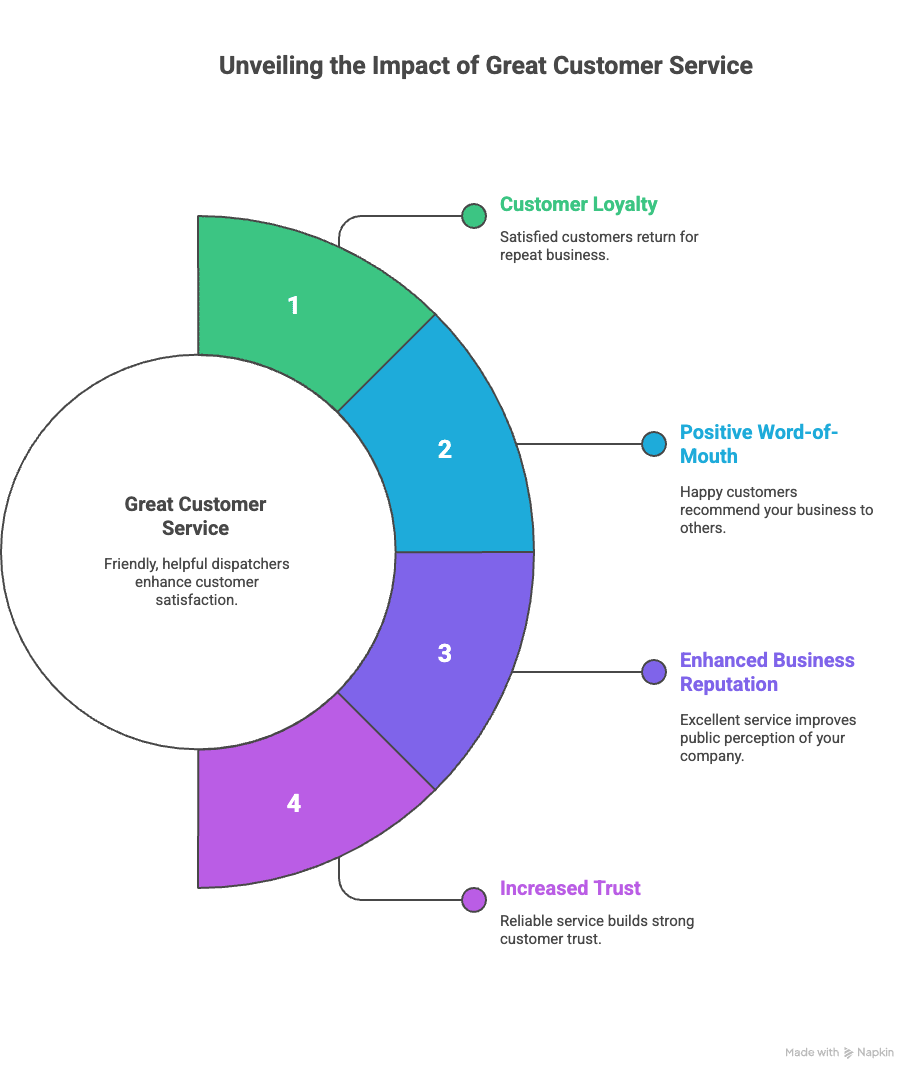In any business that relies on getting people or services to a customer’s location, the dispatcher is a key player. They’re often the first point of contact, and how they handle that interaction sets the tone for the entire customer experience. Good dispatcher customer service isn’t just about scheduling; it’s about communication, problem-solving, and making sure the customer feels heard and valued. This article looks at why this role is so important and how to make it work better for your company.
Key Takeaways
- Effective dispatcher customer service directly impacts how satisfied customers are with your business. A dispatcher who communicates well and handles requests efficiently can lead to repeat business.
- Dispatchers are central to keeping operations smooth. They manage schedules, relay information, and often act as the first line of support, preventing or resolving issues before they escalate.
- Investing in training and clear processes for your dispatchers can significantly improve your business’s reputation and profitability by ensuring reliable service and happy customers.
The Crucial Role of Dispatcher Customer Service in Daily Operations
Think about the backbone of any service business that sends people out to do jobs. It’s the dispatcher. They’re not just scheduling appointments; they’re the first point of contact for many customers and the central hub for keeping everything running smoothly. The importance of dispatcher service can’t be overstated because they directly influence how customers perceive your business from the very first interaction.
When a customer calls, it’s often because they have a problem or a need. The dispatcher’s ability to listen, understand, and then efficiently schedule the right service is what sets the tone. A well-handled call can turn a potentially frustrated customer into a loyal one. Conversely, a disorganized or unhelpful dispatcher can quickly lead to dissatisfaction, even if the actual service provided later is good.
Here’s a look at what makes their role so vital:
- First Impression: They are often the initial human interaction a customer has with your company. Their professionalism and helpfulness create the first impression.
- Operational Flow: Dispatchers manage the flow of work, assigning tasks to technicians and ensuring they have the necessary information. This keeps the entire operation moving.
- Problem Solving: When issues arise, like a technician running late or a scheduling conflict, the dispatcher is on the front lines, working to find solutions and communicate with customers.
- Record Keeping: They typically maintain important customer and job records, which is key for tracking, billing, and future reference.
The dispatcher acts as a critical link between the customer and the service team. Their effectiveness directly impacts customer experience and operational efficiency. A good dispatcher can smooth over potential issues before they even become problems for the customer.
Without a competent dispatcher, businesses risk miscommunication, missed appointments, and unhappy customers. It’s a role that requires strong organizational skills, good communication, and the ability to stay calm under pressure. They are, in many ways, the unsung heroes keeping the wheels of service businesses turning.
How Efficient Dispatching Improves Customer Satisfaction
When your dispatching runs like a well-oiled machine, it directly impacts how happy your customers are. Think about it: if a service tech or a delivery driver gets to a customer’s location quickly and knows exactly what they’re doing, that’s a win. It means less waiting around for the customer, and the problem gets fixed or the item gets delivered faster. This kind of reliability builds trust. Customers start to see your business as dependable, and that’s a big deal.
Efficient dispatching means we’re smart about sending people out. We try to group jobs geographically or send the right person with the right skills the first time. This cuts down on travel time and makes sure the job gets done right without needing a second visit. This focus on getting it right the first time is a huge factor in customer happiness.
Here’s how it breaks down:
- Faster Response Times: When a customer needs something, getting there quickly makes a big difference. Efficient dispatching helps make this happen.
- Accurate Arrival Estimates: Giving customers a realistic time window for when they can expect service or delivery means they can plan their day. No one likes guessing games.
- Problem Resolution: Getting the right technician or driver to the job means issues are solved more effectively, often on the first try. This saves the customer time and frustration.
- Clear Communication: Keeping customers informed about their appointment or delivery status, especially if there are delays, is key. It shows you respect their time.
A smooth dispatch process means fewer headaches for everyone involved. It’s not just about moving people around; it’s about making sure the customer’s experience is as positive as possible from start to finish. This directly affects whether they’ll come back to you for future needs, and even if they’ll recommend you to others. A poor delivery experience can really hurt your business, with many shoppers saying they won’t return after just one bad encounter [144c].
When dispatching is optimized, it can also lead to cost savings through better route planning and reduced travel. These savings can sometimes be passed on to the customer, making your service more attractive. It’s all about making the entire process, from the initial request to the final service, as smooth and positive as possible for the person you’re serving. This kind of attention to detail in dispatching is what separates good businesses from great ones, and it’s a big reason why customers stick around. Efficient warehousing, for example, can also contribute to overall cost savings without sacrificing service quality [a6e8].
Common Challenges in Dispatcher Customer Service
Even with the best intentions, managing dispatcher customer service isn’t always smooth sailing. Several common issues can pop up, making it tough to keep everyone happy and operations running like clockwork. One big hurdle is communication breakdowns. It’s easy for messages to get mixed up or delayed between dispatchers, drivers, and customers, especially when things are moving fast. This can lead to missed appointments, incorrect information, or frustrated clients who don’t know what’s happening with their service or delivery. Clear, consistent communication is key to avoiding these problems.
Another frequent challenge is dealing with unforeseen changes. Whether it’s a sudden traffic jam, a vehicle breakdown, or a customer needing to reschedule, dispatchers have to adapt on the fly. This requires quick thinking and the ability to adjust schedules and routes without causing major disruptions. Sometimes, dispatchers also struggle with resource allocation, trying to make sure the right people and equipment are in the right place at the right time. This is especially tricky in industries like trucking, where demand can fluctuate wildly.
Here are some typical problems encountered:
- Information Overload: Dispatchers often juggle multiple calls, texts, and system alerts simultaneously, making it hard to process everything accurately.
- Conflicting Priorities: Balancing urgent customer requests with existing schedules and driver availability can be a constant juggling act.
- Technical Glitches: Software issues or connectivity problems can bring dispatch operations to a standstill, impacting efficiency and customer trust.
- Managing Expectations: Customers often expect immediate service or precise arrival times, which aren’t always realistic given operational constraints.
The reality is that operations with a human element will always have some bumps. The goal isn’t perfection, but rather having effective systems and people in place to minimize issues and handle them well when they do arise. This often means having dispatchers who can also handle customer inquiries, especially in smaller operations, to ensure a smooth flow of information.
For businesses like plumbing and HVAC, where 24/7 availability is expected, these challenges are amplified. Missed calls or long hold times can mean lost business. Having a system that allows customers to always reach a helpful voice, even outside of business hours, is incredibly important for client retention. This is where professional virtual dispatching services can make a significant difference, ensuring that urgent issues are addressed promptly and customers feel supported.
Best Practices to Strengthen Your Dispatcher Customer Service
Making sure your dispatchers are set up for success is key to good customer service. It’s not just about sending people out; it’s about how they interact with customers from the first call to the job’s completion. Think of your dispatchers as the conductors of your service orchestra – they need to keep everything running smoothly and harmoniously.
Here are some ways to build a stronger customer service approach for your dispatch team:
- Clear Communication Protocols: Establish standard ways for dispatchers to talk to customers. This includes how to answer the phone, what information to gather, and how to set expectations about arrival times and service details. Consistent messaging builds trust.
- Active Listening Training: Dispatchers should be trained to really listen to what customers are saying, not just hear them. This means understanding their needs, concerns, and any frustrations they might have. Showing empathy goes a long way.
- Problem-Solving Skills Development: Equip your dispatchers with the tools and training to handle unexpected issues. Whether it’s a scheduling conflict or a customer complaint, they should feel confident in finding solutions.
- Technology Support: Ensure your dispatchers have the right tools. This could be updated software for scheduling, GPS tracking for field staff, or communication platforms that make it easy to stay in touch with both customers and technicians. Good dispatcher communication support is vital.
The dispatcher’s role often blends customer service with operational management. They are frequently the first and last point of contact, making their interactions highly impactful on the customer’s overall experience. Investing in their training and providing them with the right resources directly translates to better customer retention and a stronger business reputation.
- Regular Feedback and Coaching: Don’t just train them once. Provide ongoing feedback based on call monitoring or customer surveys. Regular coaching helps them refine their skills and address any weaknesses in their customer service for dispatchers approach.
The Business Impact of Reliable Dispatcher Customer Service
When your dispatchers handle calls well, it directly affects your company’s bottom line. They are often the first point of contact for customers, and their interactions set the tone for the entire service experience. Good dispatching means happy customers, and happy customers mean repeat business and positive word-of-mouth.
Think about it: a customer calls with a problem. If the dispatcher is polite, efficient, and can quickly arrange for a technician to visit, that customer feels heard and valued. This positive interaction can turn a potentially negative situation into a win for your business. Conversely, a rude or disorganized dispatcher can drive customers away, even if the actual service provided later is excellent.
Here’s how strong dispatcher customer service helps:
- Increased Customer Retention: When customers have a good experience from the initial call, they are more likely to stick with your company.
- Improved Brand Reputation: Positive interactions build trust and make your business look professional and reliable.
- Higher Operational Efficiency: Smooth scheduling and clear communication reduce wasted time and resources.
- More Sales Opportunities: Dispatchers can identify needs and upsell services or schedule follow-ups.
Using effective business dispatch solutions helps manage these interactions. These systems can track customer history, optimize schedules, and provide dispatchers with the information they need to offer personalized service. This structured approach minimizes errors and makes sure that every customer feels important.
A well-run dispatch system isn’t just about sending people out; it’s about managing relationships and expectations. It’s the backbone of smooth operations and a key driver of customer loyalty. When dispatchers are trained and supported, they become your frontline ambassadors, directly influencing how people perceive your entire company.
Great customer service from your dispatch team can really help your business. When your dispatchers are friendly and helpful, customers feel good about your company. This can lead to them coming back again and again. It also means they might tell their friends about you! Making sure your dispatchers are well-trained and know how to handle calls makes a big difference in how people see your business. Good service builds trust and loyalty, which are super important for success. Want to see how we can help your business shine? Visit our website today!
Wrapping It Up
So, when you look at it all, having a good dispatcher is really a big deal for any business. They’re not just answering phones; they’re the ones keeping things running smoothly, making sure customers feel heard, and helping your team get where they need to be. It’s about making sure that first impression is a good one and that the whole process from start to finish doesn’t fall apart. Getting this part right means happier customers and a business that can handle whatever comes its way. It’s worth putting thought into how you manage this important role.
Frequently Asked Questions
Why is good customer service from a dispatcher so important?
A dispatcher is often the first person a customer speaks with. They manage appointments and ensure that the right person gets to the job on time. If a dispatcher is friendly, organized, and helpful, it makes the customer feel valued and confident in the business. This can lead to repeat business and positive reviews.
How does a dispatcher help keep things running smoothly?
Think of a dispatcher as the conductor of an orchestra. They make sure everyone knows where to go and when, preventing confusion and delays. By managing schedules and communicating with both customers and service teams, they help avoid mix-ups and keep operations efficient.
What happens if a business has a bad dispatcher?
When a dispatcher isn’t organized or doesn’t communicate well, it can cause big problems. Customers might get frustrated if appointments are missed or if they receive wrong information. This can lead to lost business and a damaged reputation, as unhappy customers are less likely to return or recommend the company.


